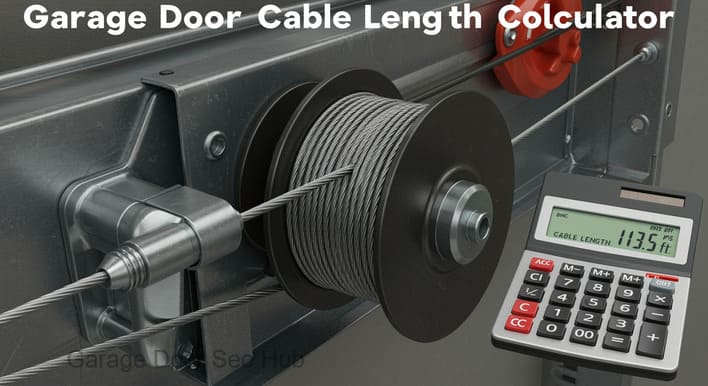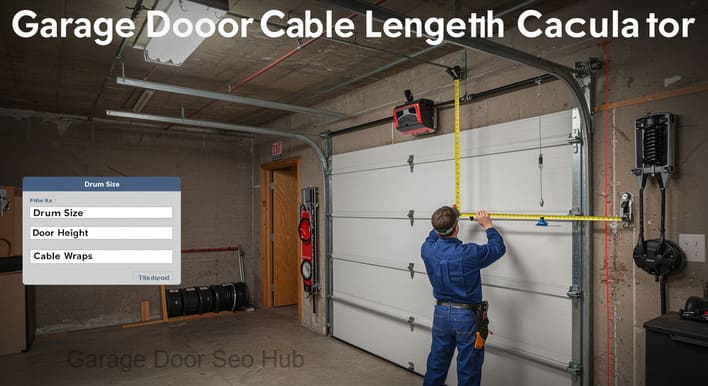Whatsapp At : +1 817 254 2207
Garage Door Cable Length Calculator

Garage Door Cable Length Calculator
Calculate the perfect cable length for your garage door in inches, feet, and meters
Drum Specifications
Door Specifications
Additional Options
Cable Length Results
Inches
Feet
Meters
Important Note
Ensure your garage door is properly balanced to prevent strain on cables and opener. An unbalanced door significantly reduces cable lifespan.
Understanding Garage Door Cable Lengths
Measurement Guide
To accurately measure for garage door cables:
- Measure from the floor to the center of the torsion shaft
- Measure door height at its tallest point
- For high-lift doors, measure from floor to bottom of horizontal track
- Always add 3-5 inches as a safety buffer
Drum Types
Different drum types require specific cable length calculations:
- Standard Lift Drums: For doors with ~12" headroom
- Hi-Lift Drums: For garages needing space below open door
- Vertical Lift Drums: For commercial settings with high ceilings
Safety Considerations
Proper cable installation is critical for safety:
- Always disconnect opener before working on cables
- Use winding bars for torsion spring systems
- Never remove cables without supporting the door
- Wear safety glasses during installation
Cable Selection
Choosing the right cable:
- Residential doors: 1/8" or 3/16" diameter
- Commercial doors: 1/4" diameter
- For heavy doors (>300 lbs): Use 7x19 aircraft cable
- Always use galvanized or stainless steel cables
© 2025 Garage Remodel Calculator | Garage Door Seo Hub
For professional Seo Services , contact us at WhatsApp +92 395468434
What Is a Garage Door Cable Length Calculator?
A garage door cable length calculator is an online tool that helps determine the correct cable size for your garage door. It calculates the ideal cable length based on your door’s height, width, drum size, and spring system. Garage door cables are essential for lifting and lowering the door smoothly. If the cable length is wrong, it can cause uneven movement, misalignment, or damage to other components.
This tool is helpful for homeowners, technicians, and DIY enthusiasts. Whether you have a torsion spring system or an extension spring setup, the calculator gives you precise cable measurements for safe and efficient operation.
Why Correct Cable Length Matters?
Using cables that are too short or too long can lead to serious issues. Incorrect sizing can cause the door to jam or put unnecessary stress on the opener and springs.
Key Benefits of Correct Cable Sizing:
- Ensures Smooth Lifting: Perfect cable tension balances the door’s weight.
- Prevents Cable Slipping or Overwinding: Keeps torsion drums and springs aligned.
- Increases Safety: Reduces the risk of sudden cable snaps or door crashes.
- Reduces Opener Wear: Balanced doors require less force, protecting the motor.
A cable length calculator removes the guesswork, giving you reliable measurements that match your garage door’s design and hardware setup.
You Might Like : Calculate Loan for Garage Door Project
How the Garage Door Cable Length Calculator Works
The calculator uses standard formulas from garage door industry guidelines to find the correct cable length.
Input Fields:
- Door height and width.
- Drum diameter and type.
- Spring system (torsion or extension).
- Cable thickness (e.g., 1/8 or 3/16 inch).
- Lift type (standard, high-lift, or vertical-lift).
Output:
- Recommended cable length for your door height.
- Cable material type (galvanized or stainless steel).
- Spring and drum compatibility details.
- Suggestions for replacement cable kits.
This tool ensures you get the right size cable every time, saving time, money, and potential safety hazards.
Standard Garage Door Cable Lengths
Garage door cable lengths depend on the height of the door and the lift type. Most residential garage doors follow standard size patterns, but the actual cable needed may vary slightly based on drum size and hardware setup.
Common Residential Cable Lengths:
- 7-foot tall door: Needs an 8 to 8.5-foot long cable.
- 8-foot tall door: Needs a 9 to 9.5-foot long cable.
- High-lift or vertical-lift doors: Often require 12 to 16-foot cables—or more—based on ceiling height and drum placement.
These are general benchmarks. The garage door cable length calculator takes these standard measurements and adjusts them according to your custom inputs like spring type and drum size. This ensures smooth door operation and balanced lifting every time.
Types of Garage Door Cables
Not all garage door cables are the same. Depending on your setup and door type, you may need a specific kind of cable. The calculator helps you choose the right cable type for safety and durability.
Main Cable Types:
- Lift Cables: These are used with torsion spring systems. They connect to the bottom brackets and wind onto the drums.
- Retaining (Safety) Cables: Found in extension spring systems, they prevent springs from snapping dangerously.
- High-Lift Cables: Used when the door opens higher than normal tracks, common in commercial setups.
Cable Materials:
- Galvanized Steel: Standard, rust-resistant, and strong enough for most homes.
- Stainless Steel: Ideal for coastal or humid areas where corrosion is a concern.
With the calculator, you get tailored recommendations for cable type, thickness, and material, making sure your garage system is safe and long-lasting.
Cable Length and Drum Size Relationship
Cable length isn’t just about the door height—it also depends on the drum size. Each drum has grooves where the cable winds. Larger drums need longer cables to complete the lift smoothly.
Key Points:
- Standard drum sizes: Usually between 4 to 6 inches in diameter.
- High-lift drums: Designed for doors that rise straight up before curving, requiring more cable wraps.
Basic Cable Length Formula:
(Door height + 18 inches) × number of wraps = cable length
This formula helps calculate how much cable is needed to complete a full open cycle. The calculator uses this logic to offer exact cable lengths for every kind of drum and door setup.
By combining your door height, lift type, and drum diameter, the cable calculator delivers precise, safe, and efficient results.
Garage Door Cable Maintenance Tips
Knowing your cable length is only the start. Regular maintenance is essential to keep your garage door safe and reliable. Neglecting cables can lead to sudden breaks, misaligned doors, or costly repairs.
Key Maintenance Tips:
- Inspect Cables Regularly: Look for fraying, rust, or kinks. These signs indicate weakening and the need for replacement.
- Lubricate the Cables: Use a non-greasy, silicone-based spray to protect against corrosion and moisture. Avoid heavy oils as they attract dirt.
- Replace Old Cables: Most garage door cables last 7–10 years, depending on use. Replace them earlier if you notice damage or uneven lifting.
A garage door cable length calculator can also suggest the correct cable thickness and provide replacement schedules based on your door’s size and daily usage.
DIY vs. Professional Cable Replacement
Replacing garage door cables requires precision and safety awareness. Springs and cables are under extreme tension, making mistakes dangerous.
DIY Replacement:
- Suitable for experienced homeowners with the right tools and knowledge.
- Requires careful handling of torsion springs and drums.
- Cheaper but riskier if done without proper safety measures.
Professional Service:
- Technicians ensure exact cable length, correct tensioning, and smooth operation.
- Includes spring and drum adjustments, which are tricky for DIY setups.
- Safer and often comes with warranty coverage.
The calculator can also give cost estimates for both DIY cable kits and professional installation services.
Garage Door Cable Cost Breakdown
The price of garage door cables depends on length, type, and material.
Typical Cost Ranges:
- Standard lift cable kit: $15–$40 per pair.
- High-lift or custom cables: $30–$70 per pair.
- Professional replacement service: $100–$200 (includes labor and adjustments).
A garage cable length calculator can help estimate the total cost based on your door specifications and hardware needs.
FAQs: Garage Door Cable Length Calculator
Q1: How do I measure my garage door cable length?
Measure from the bottom bracket to the cable drum, then add extra for drum wraps.
Q2: Can I reuse old cables?
No. Old, frayed, or rusted cables are unsafe and must be replaced.
Q3: Do high-lift doors need special cables?
Yes. These doors require longer, stronger cables designed for vertical-lift systems.
Q4: Can I adjust cable length myself?
Only if you’re experienced. Incorrect adjustments can be dangerous due to spring tension.
Final Thoughts: Use a Garage Door Cable Length Calculator
A garage door cable length calculator helps you pick the right cable size, reducing safety risks and ensuring smooth operation. Whether planning a DIY project or hiring a technician, this tool saves time, avoids guesswork, and ensures accurate results.

